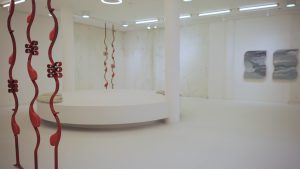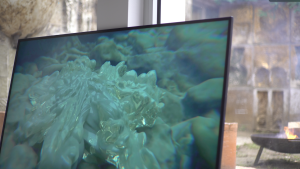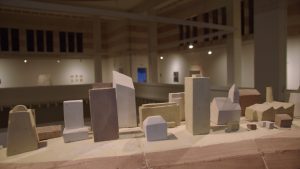Embed
Embed
Matrena Makovická bola manželkou Dušana Makovického – lekára a fanúšika Leva Nikolajeviča Tolstého. Táto výstava je venovaná jej pamiatke a jej vlastnému pohľadu na historické súvislosti spojené s „tolstojovskou“ legendou. V klasickom naratíve o živote Dušana Makovického bol totiž doteraz Matrenin príbeh takmer vynechaný.
Spracovanie jej pohľadu na dané udalosti sa naviac dotýka niekoľkých dekád rodinnej histórie Kataríny Hládekovej. Autorkin starý otec Vladimír Majerčiak kedysi uskutočnil s Matrenou rozhovor a na magnetofónovú pásku zaznamenal jedinú nahrávku jej hlasu, ktorú následne spracoval do monografie. Zvukovú stopu použila ako základ pre svoje rozhlasové pásmo o mnoho rokov neskôr jeho dcéra, Daniela Hládeková. Ďalšia generácia žien v rodine sa k existujúcim prameňom stavia s ideálom retroaktívneho prepisu. Básne Mayi Hládek svojou formou narážajú na hrdinské eposy a pátos spojený s národnými dejinami.
História je častokrát vykresľovaná z pohľadu „bieleho muža“, jeho hrdinstiev a lások, a je písaná jazykom, ktorý v mnohom zasahuje do spôsobu, akým si dodnes vykresľujeme obraz jeho ženskej súpútničky. Ani zdanlivo uvoľnený priestor beletrie nie je nevinný. Postava Matreny v románe Petra Zvána, Ajhľa človek!, z roku 1947 o živote Dušana Makovického nám napovie viac o Zvánovi než o Makovickej, viac o vnímaní žien vo všeobecnosti než o Matrene samej.
Celý projekt je špekuláciou nad možnosťami interpretácií života osoby, ktorá žila v tieni velikána, teda života strateného v historických prameňoch, ich nedostatku alebo naopak v ich hypertrofii.
Prostredníctvom spojenia viacerých subjektívnych pohľadov preveruje schopnosti dlho budovaného jazykového systému vytvoriť viac než len oklieštenú a málo individualizovanú rekonštrukciu ženskej osobnosti.
Matrena Makovická was a wife of Dušan Makovický – personal physician and a supporter of Lev Nikolayevich Tolstoy. This exhibition is dedicated to her memory and to her own view on the historical connections with Tolstoy’s legacy. Matrena’s story was very much omitted in the standard narrative of Dušan Makovický’ s life.
The interpretation of Matrena’s life concerns multiple generations of Katarína Hládeková’ s family. Grandfather of the author, Vladimír Majerčiak, taped an interview with Matrena, making it the only recording on her voice, on which he based a monogtaphy about her life. His daughter, Daniela Hládeková, used this recording many years later in her radio program. The next generation of women in the family uses existing resources in the ideal of retroactive transcription. Poems f Maya Hládek hint at heroic eposes and the excitement connected with national history.
As the history often takes the perspective of a “white male” and his loves and heroisms, it clearly reflects the way in which the life of his lifelong partner is being described. Not even the seemingly uplifting fiction genre is innocent. The character of Matrena in Peter Zván’s novel about Dušan Makovický’s life “Ajhľa človek!” from 1954 tells us more about Zván himself, instead of about Makovická; and more about the way women were perceived in general, then about Matrena herself.
The whole project is a speculation of the possibilities how to interpret a life of a person living in the shadow of a hero, a life lost in the historical sources, the lack of such sources and/or their hypertrophy.
Throughout connecting various subjective perspectives, the project tries the capacities of a language system built over the years to create more than just a modest and lowly individualized reconstruction of a female figure.















